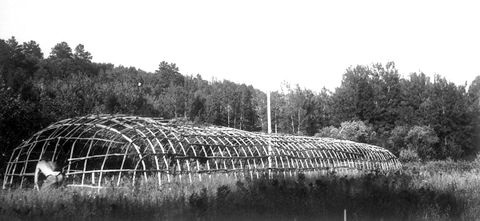Medicine Tent

What does Du Vernet mean when he speaks about the “medicine tent” or “long tent”? Du Vernet mentions the “medicine tent” several times throughout his diary, often lamenting about how the Ojibwe Christians—despite missionary efforts to discourage the practice—continue to return to Ojibwe ceremony in the medicine tent or long tent. He does not explicitly define the medicine tent, and applies the term broadly to a variety of occasions when Ojibwe gather to hold ceremonies and/or conduct medicinal practices.
Impressions and Definitions
Perhaps Du Vernet doesn’t define “medicine tent” because he didn’t understand the significance of Ojibwe ceremony that was going on around him. Bimaadiziwin, the Ojibwe word for “life,” could also be translated as “living the good life”: maintaining health, wellbeing, and “right relations” with all of Creation. The practices of healing and grieving that Du Vernet described in his writing about the “medicine tent” were clearly important to the Ojibwe people and families whom he met. However, like most missionaries, he dismissed such practices for not conforming to Christian spiritual understandings.
Contempt or Admiration?
Although Du Vernet criticized Ojibwe ritual practices, the fact that the medicine tent features so prominently in his diary reveals that he was also fascinated by Ojibwe medicine and ceremony.
For example, on July 18th, Du Vernet had a first hand experience in a “medicine tent” (or what he explains was a house being used as a medicine tent) which left a lasting impression on him. After describing the ceremony, Du Vernet concludes his entry by stating: “it was very sad this propitiation offered in ignorance to a higher power. Even though it was all such a fraud the Medicine men getting the spoils–I stood with uncovered head with a feeling of reverence.” Though he derides the ceremony as ignorant, he cannot help but feel its power.
The Medicine Tent Outlawed
Despite Du Vernet’s confused understanding of Ojibwe ceremony, his diary reveals Ojibwe commitment to the Midewiwin society despite government persecution. In 1895, just before Du Vernet visited the Rainy River, the Canadian government revised the Indian Act and forbade Indigenous peoples across Canada from participating in ceremonies and practices that defined their political and spiritual worlds. Although most, if not all, of the practices encompassed within Du Vernet’s term “medicine tent” would have been outlawed at the time of his visit, he does not discuss these ceremonies in terms of legality, and we are able to see how those same practices remained prevalent along the Rainy River at the time.
Sources
Johnston, Basil. The Manitous: The Spiritual World of the Ojibway. New York, Harper Collins Publisher, 1995.
Johnston, Basil. Ojibway Ceremonies. Toronto, McClelland and Stewart, 1982.